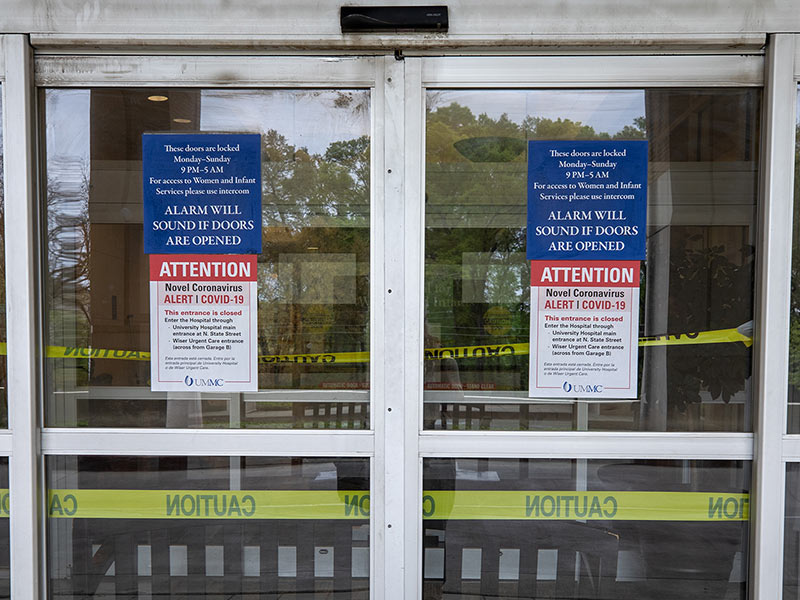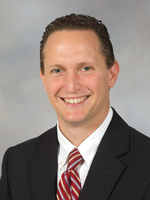Medical Center experts offer advice on dealing with COVID-19 stressors

You’re not sounding the alarm to friends and family just yet, but you’re down to a six-pack of toilet paper, and you’re kicking yourself for not stocking up when it was on shelves two weeks ago.
It’s just one more stress to juggle during the current COVID-19 outbreak, with health experts advising Mississippians to hole up at home, and fears about contracting the highly contagious virus a great motivator for seclusion.
Take a step back and focus on what’s in your power, not what isn’t, experts at the University of Mississippi Medical Center say.

“I don’t have control over whether there will be toilet paper in the store. All I can do is make reasonable attempts to get it, and if worst comes to worst, come up with a plan B,” said Dr. Daniel Williams, division chief in the Department of Psychiatry and Human Behavior and associate director in the Office of Well-being. “When people don’t have things, they get very creative.”
No matter what is upsetting you, your feelings are normal and nothing to be ashamed of, Williams said.
“These are unprecedented times. What we are experiencing is abnormal, and we’re having anxiety that we normally wouldn’t have,” he said. “We need to recalibrate and recognize this as a period of uncertainty, and we need to adjust.
“It’s not helpful to think that things will be normal in a while. They won’t.”
Williams and other Medical Center experts offer advice on how to cope with a very unwelcome new normal and, quite frankly, just to get through your day:
- Try not to fixate on worrisome things, no matter how big or small, that you can’t change. “I have no control over the stock market, so I probably shouldn’t put my time and energy into that,” Williams said. “Let’s not worry about the short-term pain there. I don’t have control over whether my loved ones will stay well, but I do have control over whether I practice social distancing around them, or wash my hands around them.”
- A trip to the grocery store can be scary for those who look at empty shelves, or pictures of them on Facebook. “Here’s where we need to focus on objective data,” Williams said. “Every day, almost all grocery stores are being restocked. The supply chain is working. We shouldn’t hoard food. That means somebody will show up at the grocery and not be able to purchase food that day.
“There’s the psychological impulse to get as much of it as you can. That’s not in anybody’s best interest. Sometimes, our impulses lead us astray.”
- Information overload on each new COVID-19 development in Italy or New York City leaves us sleepless and glued to our phone at 3 a.m. “Limit your amount of news consumption,” Williams said. “It’s tempting to stay connected to every development and update and tweet, but that creates a very stressful and anxious way of living.
“Check in on the news a couple of times a day, and then take a break from it. Do things that give you pleasure and that are in your best interests. We can’t just focus on the doom and gloom. We need to recharge ourselves.”
- Find safe ways to get around social distancing, if contact with others is important to you.

Dr. Joshua Mann, chair of the Department of Preventive Medicine and director of the Office of Well-being, this week found himself in that boat. He’s home-isolated for two weeks because of recent out-of-state travel. “I’m a very social worker. I do pretty well for a couple of hours at home alone on my email, but I start going a little stir-crazy without the opportunity to bounce ideas off my colleagues,” he said
Keep up co-worker contact via email, Face Time, Zoom, Skype and old-fashioned phone calls, and keep meetings going electronically. Without that interaction, “it really does make it difficult to get work done, and that’s stressful,” Mann said.
“Just because we’re doing social distancing doesn’t mean we have to do emotional distancing,” Williams said. “Use it as a chance to reconnect with old friends. Really reach out to each other for support.”
- Reduce anxiety about contracting the virus or spreading it by taking healthy actions that make you feel safe. That ranges from frequent hand washing to cleaning and disinfecting your desk or other surfaces you may encounter that can carry germs, Williams said. That also includes your phone!
- Create structure in your day, whether you are stuck at home or in a work twilight zone. “If you are quarantined, set an alarm and wake up at the same time you usually do. Go to bed when you usually do,” Williams said. “Make a list of what you want to accomplish that day. Maintain normalcy in your schedule.”
- Good deeds and meaningful action can help you de-stress, Mann said. “When we take action to protect the people who have underlying health conditions or who are older, we are doing something good,” Mann said. “There is research that shows if you are experiencing a high level of stress, serving others helps to diminish it. It benefits the giver as well.”
- Talk about it.
“We don’t need to pretend like this is normal. Sometimes, if you talk about it, it comes back into perspective,” Williams said. “Talk it out, and process how you are feeling. You might find that you built some of it up in your mind to be more catastrophic than it is because you were stuck in your feelings.”
And, back to that toilet paper.
“Even if you can’t get any, it’s not the end of the world,” Williams said. “You can still live a happy life. People throughout most of history have lived without it.
“We can adjust. Life will go on, and the sun will come up the next day.”


